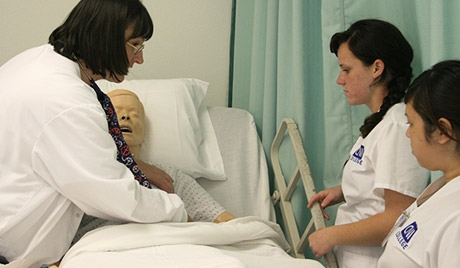How to be a nurse professor
As a nurse professor, you will be providing care to patients and educating them about their health. This requires having the proper credentials and skills. Here are some tips on how to become a nurse professor: Have a strong background in nursing. Nurse professors need to have a strong foundation in nursing. You should have an undergraduate degree in nursing or a related field and experience working as a nurse. Additionally, you should have earned an advanced degree in Nursing Instructor Jobs or another health-related field. Have experience teaching nurses. Before becoming a nurse professor, you will likely need to teach nurses in order to gain the necessary experience and knowledge for the job. This can be done as a full-time instructor or as a visiting professor at various colleges and universities around the country.
What kind of nurses get paid the most?
According to the Bureau of Labor Statistics, registered nurses (RNs) are healthcare professionals who typically work in hospitals, Nursing Professor Jobs homes, and other medical facilities. RNs are usually paid more than any other type of nurse. In 2016, the median annual salary for RNs was $70,530. In comparison, the median annual salary for all nurses was $55,590.
The highest-paid type of nurse is an RN with a doctoral degree. The median annual salary for RNs with a doctoral degree was $87,090 in 2016. This is more than twice the median annual salary for all RNs ($37,270).
Is becoming a nurse educator worth it?
Becoming a nurse educator can be a rewarding career. The National Association of State Directors of Nursing Education (NASDNE) reports that the average annual salary for registered nurses with an associate’s degree is $71,980. However, there are many factors to consider when making this decision.
Nurse educators must have an undergraduate degree in nursing, along with at least three years of post-secondary experience in a clinical setting. They must also have at least an associate’s degree in nursing and pass an exam to become certified as a nurse educator. There are many opportunities for advancement within the field, including positions as directors of nursing education, faculty members at universities and colleges, and administrators at state agencies that oversee nursing programs. There are several benefits to becoming a nurse educator.
Can I be a professor with a DNP?
Are you a nurse practitioner looking to become a professor? There is a path available for you! The Doctor of Nursing Practice (DNP) is an advanced degree that can help you become a professor. Here are some tips on how to become a DNP: It’s important to have experience as a nurse practitioner before applying to the DNP program. This will show in your application and interviews. Be prepared for difficult questions about clinical practice. Make sure you are well-versed in academic literature and current trends in nursing research. Demonstrate expertise in teaching/mentoring students. This includes developing course materials, grading exams, and supervising student projects. Make sure your research reflects the needs of patients and the nursing profession. Show that you have published scholarly work that has been accepted by an appropriate journal.
How do I become a nursing professor?
To become a nursing professor, you need to have a doctoral degree in nursing and meet certain qualifications. Typically, you must have experience as a registered nurse or have completed an equivalent program. You also need to have published research in nursing journals and be able to teach undergraduate and graduate students. Becoming a nursing professor can be difficult, but it’s a rewarding career.
How much do nursing professors make?
Nursing professors make a pretty decent living. A survey of nursing professors in the US found that the median salary was $118,000 per year. That’s a pretty good paycheck for a job that often has long hours and requires a lot of dedication. And it doesn’t stop there – nursing professors can also benefit from excellent benefits packages, including paid vacation time and sick leave. So if you’re looking for a high-paying career with plenty of perks, nursing might be the perfect option for you.
Who is a professor in nursing?
There are many different types of professors in nursing. Some are full-time, while others are part-time. The majority of professors either hold a Ph.D. or a DNP. Interestingly, not all professors in nursing are nurses themselves!
One type of professor is the adjunct professor. An adjunct professor is usually a retired nurse who has taken on additional teaching responsibilities to make ends meet. They are typically paid less than a regular professor and have fewer benefits, such as tenure.
Regular professors typically have more research opportunities than adjunct professors do and often have more influence in the field they teach. They also tend to be more experienced clinicians, which can give their students insights that they may not get from an adjunct professor.
How long does it take to become a professor of nursing?
Nursing is a highly respected and demanding profession. Becoming a professor of nursing takes many years of hard work and dedication. Before you can even think about becoming a professor of nursing, you need to have a bachelor’s degree in nursing. After you have your Bachelor’s degree, you need to complete an accredited nurse practitioner program. Next, you need to obtain a master’s degree in nursing. Finally, you must complete an additional doctoral program in nursing to become a professor of nursing. It can take up to 10 years to become a professor of nursing, but the rewards are worth it!
How many hours does a nursing professor work?
How many hours does a nursing professor work? In order to maintain quality instruction, nursing professors typically work between 50 and 70 hours per week. This includes grading papers and preparing lectures but does not include advising students or conducting research.
Which degree is best for a professor?
Choosing a degree for a career in academia can be daunting. There are so many options out there, and which one is the best for a professor? Here are eight factors to consider:
- Location. Do you want to be near your research or teaching colleagues? Are you prepared to commute long distances?
- Degree requirements. Are your degrees in subjects that are required for the position you want? Some schools require a certain number of credits in specific areas, such as business or humanities, while others may not care as long as you have an academic degree.
- Industry experience. Have you worked in related fields outside of academia? Knowing what is expected of professors and having experience meeting those standards can give you an edge when applying for jobs.
- Research potential. Do your research interests align with the school’s research focus?
How do you become a professor?
There are many different paths to becoming a professor. Depending on your background, education, and experience, you may have to complete an undergraduate or graduate degree or receive additional training and certification. Once you’ve completed all of the necessary steps, you can begin the process of applying for positions in colleges and universities.
Final Thought:
Being a nurse professor can be both rewarding and challenging. However, with the right attitude and preparation, it can be a rewarding experience that allows nurses to share their knowledge and expertise with future nurses. The key is to be proactive in seeking out opportunities to teach, as well as stay up-to-date on current trends in nursing. Finally, remember that being a nurse professor is a vocation, not a job; take pride in your work and enjoy sharing your knowledge and insights with others.




